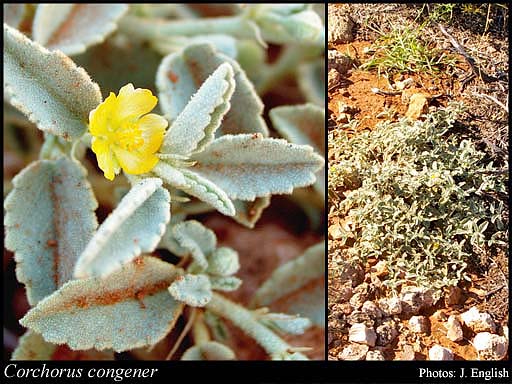- Reference
- Austrobaileya 6:586-588, 628, Fig. 3 (2004)
- Conservation Code
- Priority Three
- Naturalised Status
- Native to Western Australia
- Name Status
- Current
Spreading shrub, to 0.6 m high. Fl. yellow, Apr to Jun or Aug to Nov. Sand, red sandy loam with limestone. Sand dunes, plains.

Scientific Description
Shrub, with hairy stems. Leaves 15-60 mm long, 5-40 mm wide, not lobed; margins serrate; hairy, with stellate hairswith scales absent, Sessile glands absent; stipules present but early deciduous (only visible on youngest leaves), 15-19 mm long. Perianth clearly of two whorls (calyx and corolla), the corolla obvious and prominent. Pedicel present, 3.5-5 mm long; indumentum present, with stellate hairs present, with scales absent. Epicalyx (extra segments or 'bracteoles' immediately below the calyx) absent. Calyx cream or white, 7 mm long, the lobes fused less than half their length, Sessile glands absent, stellate hairs present, scales absent, Terminal appendages absent, number of ribs absent. Corolla yellow, 6 mm long, glabrous. Indumentum (outside) Sessile glands absent. Stamens five, free and inserted at the base of the ovary; filaments present, 3.8-4 mm long; anthers 0.3 mm long, indumentum absent (anthers glabrous). Staminodes absent, appendages absent. Ovary hairs or scales present, simple hairs absent, stellate hairs present, gland-tipped hairs absent; style 1, with a lobed or capitate stigma, 2.5-2.7 mm long, with one style branches or lobes, mostly glabrous, wing absent. Flowering time April, May, June, August, September, October or November. Distribution Botanical Province Eremaean, IBRA Bioregion Pilbara and Carnarvon. Conservation Code Priority Three (P3).
Distribution
- IBRA Regions
- Carnarvon, Pilbara.
- IBRA Subregions
- Cape Range, Hamersley, Roebourne.
- IMCRA Regions
- Ningaloo, Pilbara (nearshore).
- Local Government Areas (LGAs)
- Ashburton, Exmouth, Karratha.